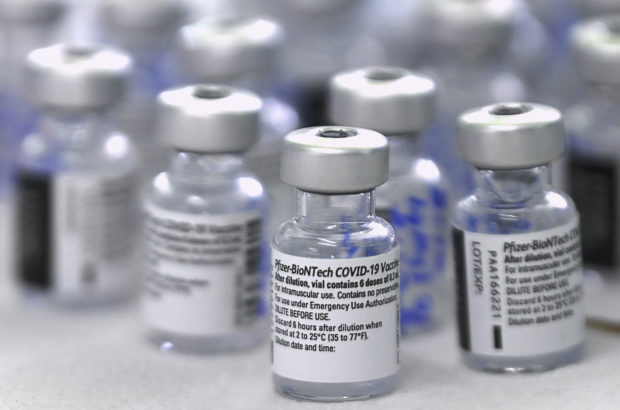US to ‘supercharge’ pandemic fight with huge vaccine donation

Picture of vials of the Pfizer-BioNTech vaccine against COVID-19 AFP FILE PHOTO
WASHINGTON — The United States will buy 500 million Covid-19 vaccine doses to distribute among poorer nations, the White House said Thursday, a huge donation to “supercharge” the pandemic fight with many parts of the world still struggling to contain the coronavirus.
The move comes as pressure over vaccine inequality grows on rich countries that secured most early supplies and where rapid immunization programs are allowing a gradual return of normal life, such as the resumption of indoor dining in France and Belgium this week.
The United States has also faced criticism for sitting on huge stocks of unused vaccines, but with more than 60 percent of Americans having received at least one shot, Washington is moving to reclaim global leadership with the donation of 500 million Pfizer-BioNTech jabs to 92 poor and lower-middle-income nations.
The White House described it as a “historic action that will help supercharge the global fight against the pandemic,” and President Joe Biden will make the formal announcement on Thursday.
“This is the largest-ever purchase and donation of vaccines by a single country and a commitment by the American people to help protect people around the world from COVID-19.”
Biden, who is attending the G7 summit in Britain this week, will also call on “the world’s democracies” to contribute more to the supply of vaccines.
The massive American donation will be channeled through the Covax program, which aims to ensure the equitable distribution of vaccines around the world.
The White House said the doses will start shipping in August, with the first 200 million delivered by the end of the year and the remaining 300 million in the first half of 2022.
Dismissing suggestions that it is in a so-called vaccine diplomacy contest with Russia and China, the United States has described its initiatives as a return to multilateral action after the nationalist isolationism under Biden’s predecessor Donald Trump.

Vaccines for votes
The pandemic has claimed more than 3.7 million lives worldwide, and one of the deadliest recent waves was in India, another nation struggling with its vaccine rollout.
On Thursday, India reported a global record of more than 6,000 Covid-19 deaths in a day after one state dramatically revised its data upwards.
The figure is likely to further fuel concerns that India’s virus death count is much higher than the official tally of almost 360,000, the world’s third-highest toll.
The devastating wave meant India had to restrict the export of domestically produced vaccines, leaving other nations such as Nepal scrambling for alternatives.
And in Lebanon, cash-strapped politicians are offering free Covid-19 jabs to their base ahead of next year’s elections. With the country in the grip of a severe economic crisis, vaccines are a luxury for many.
Two Sputnik doses are sold to companies and associations for $38, which amounts to 500,000 Lebanese pounds at the black market rate — around three-quarters of the minimum wage.
Firas, a former insurance broker, had registered along with his wife for state-sponsored vaccination. But when a political party offered him free jabs, he chose not to wait.
“I have been unemployed for six months,” said the 52-year-old, who declined to name the party that sponsored his shot.
“How would I have afforded vaccines for two people?”
Permanent remote work?
In sharp contrast, rapid vaccination programs in wealthy nations such as those in Europe have allowed the return of activities unthinkable just a few months ago.
In France, that included sipping a drink inside a cafe, allowed on Wednesday for the first time in months.
“It’s a pleasure to have a coffee inside. Normal life is gradually resuming,” said transport worker Hammou Mraoui.
Even as steps are taken to restore life as it was before the pandemic, some changes may be here to stay.
Facebook on Wednesday said it will give employees the option of sticking with remote work for the long term, even offering to help some interested in moving to other countries.
“We believe how we work is more important than where we work,” Facebook said while sharing an update to its remote work policy.